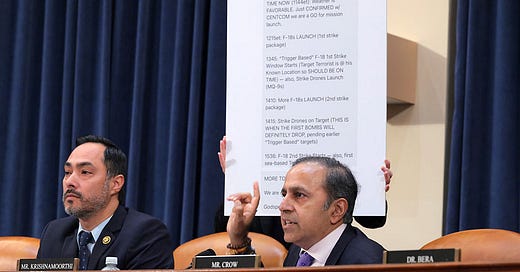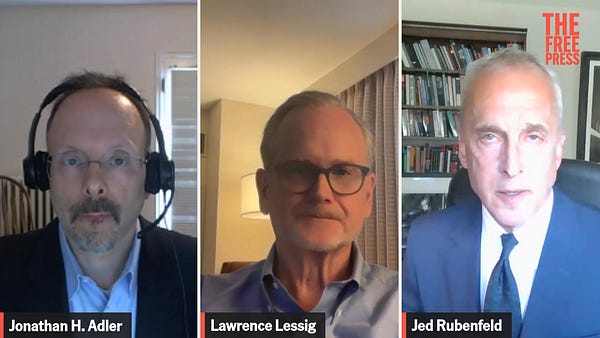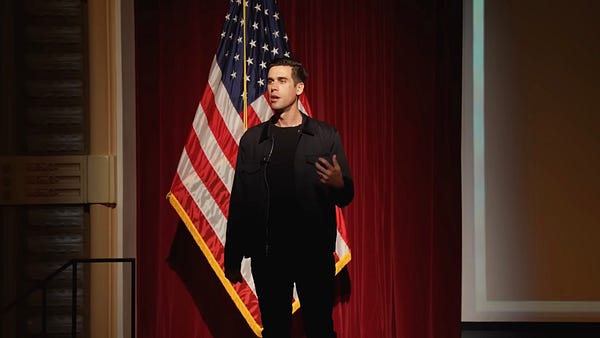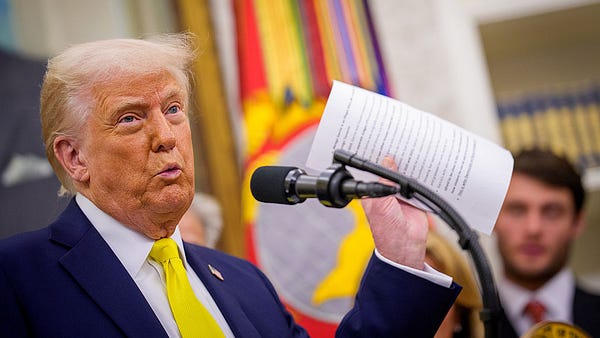
The Free Press

One story has dominated Washington this week. On Monday, Jeffrey Goldberg, The Atlantic’s editor in chief, revealed that he had been part of a group chat on the encrypted app Signal with senior Trump administration officials discussing strikes in Yemen against Houthi militants. That’s the Iranian proxy group that has spent the last two years using missiles to effectively shut down the easiest passage between Europe and the Indian Ocean, and repeatedly firing ballistic missiles at Israel—and which the Trump administration struck hard, on March 15, as they celebrated in the chat.
Once the shock over such a stunning unforced error subsided, the focus was on the behind-the-scenes look at foreign policy thinking in the administration: In the group, Vice President J.D. Vance voiced his reservations about the strikes the president had ordered; everyone seemed to have complete disdain for “freeloading” Europeans. Then the question was who Trump might fire because of the breach. But then the administration circled the wagons and took aim at Goldberg for the leak.
Goldberg did not sneak his way into this group chat, which also included the likes of Vance, Defense Secretary Pete Hegseth, CIA director John Ratcliffe, and National Security Adviser Mike Waltz. He appears to have been mistakenly added to it by Waltz.
There were, of course, some loony responses to the breach. For example, here’s a Washington Post columnist who used the incident to defend Hillary Clinton’s sloppy handling of secret emails.
Yet the story really was a significant embarrassment for the administration, and the White House resorted to spin. It implied the story was nonsense. A visibly angry Hegseth called Goldberg “deceitful and heavily discredited.”
“Nobody was texting war plans,” Hegseth insisted. “And that’s all I have to say about that.”
"I don’t know anything about it,” President Trump said. “I’m not a big fan of The Atlantic."
And in sworn testimony before Congress, Ratcliffe and Director of National Intelligence Tulsi Gabbard denied any classified information had been shared on the group chat.
Goldberg went and did the obvious move for someone in his position: He published the messages in a new story. “There is a clear public interest in disclosing the sort of information that Trump advisers included in nonsecure communications channels, especially because senior administration figures are attempting to downplay the significance of the messages that were shared,” he explained.
So, with this latest story, we now see Hegseth—the man who said there was no talk of war plans—texting things like “1215et: F-18s LAUNCH (1st strike package).”
That’s perhaps not a “war plan” in the technical sense. But language like that is, at the very least, war plan-adjacent.
With all the facts out in the open, the administration kept spinning.
In response to the new story, White House press secretary Karoline Leavitt called Goldberg “a Trump hater who is well-known for his sensationalist spin.” Hegseth retweeted a message calling the story “another hoax by the Atlantic foisted on the American people meant to undermine SECDEF Hegseth’s leadership & President Trump’s national security agenda.” But let’s remember that none of the name-calling changes the basic facts of the case—which don’t exactly reflect well on the people tasked with keeping us safe. They couldn’t keep a journalist out of their chat.
The scandal here is that Trump’s national security team appears to conduct its business on unsecured channels, and that the White House is now doing its best to downplay the screwup.
You don’t have to trust the legacy media to recognize the problem here, and find the White House’s line unconvincing. Goldberg reported what fell in his lap. Indeed, he held back sensitive details, didn’t publish the story until the attack was over, kept in touch with the relevant security and intelligence agencies in addition to the White House, and only published the full conversation once the White House forced his hand.
The administration would do best to admit that it screwed up, put in place appropriate procedures, and move forward.
Instead, the administration has been busy assuring the public that nothing in the group chat was classified, which seems to us like a rhetorical sleight of hand. Classified or unclassified, the material discussed was certainly secret and sensitive. Sharing sensitive material outside approved channels is something that simply can’t happen.
“The White House is in denial that this was not classified or sensitive data,” Representative Don Bacon, a Republican from Nebraska, told reporters on Wednesday. “They should just own up to it and preserve credibility.” We agree.
Karl Marx famously said that everything in history happens twice: first as tragedy, then as farce. This time, however, we got the farce first. The American public needs assurances that this administration is up to preventing the tragedy.
For more coverage of the group chat debacle, read Eli Lake’s piece, “A Signal Screwup—and What It Means.”













